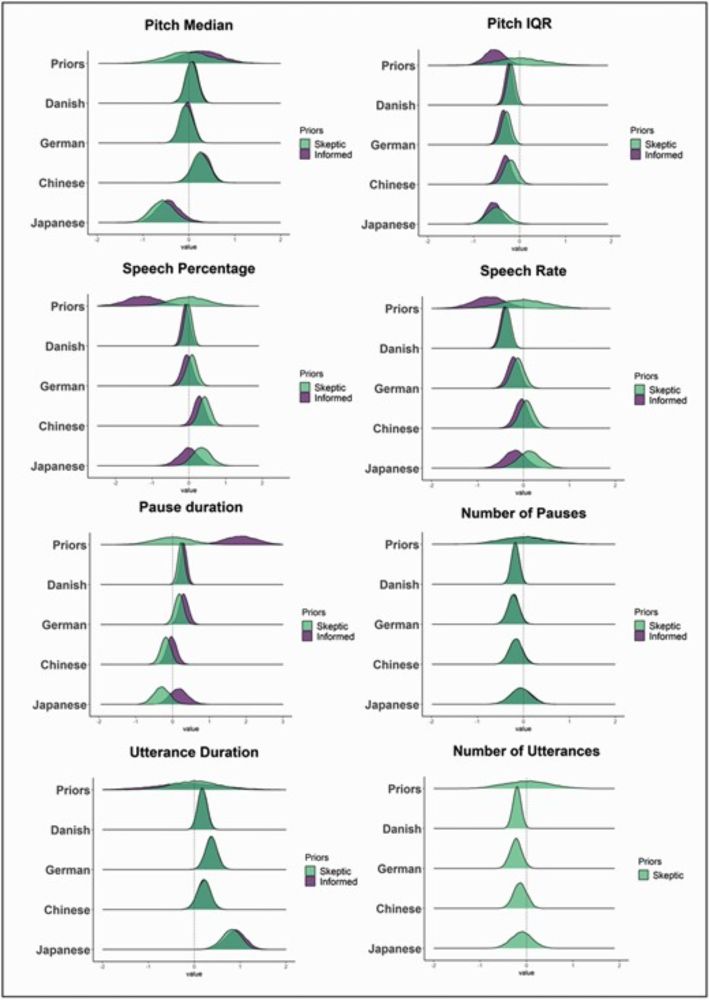5. Another brick in the wall critically assessing vocal markers of neuropsychiatric conditions: bsky.app/profile/alpa... As in many previous efforts, we show that machine learning markers as identified in current practices don't generalize 6/
24.12.2025 09:04 — 👍 1 🔁 1 💬 1 📌 0
Are there cross-linguistic vocal characteristics of schizophrenia? We test current machine learning approaches and show that they do generalize across languages *not even when being trained cross-linguistically*. Excellent thread by @alpar.bsky.social w some ways forward.
03.12.2024 16:28 — 👍 3 🔁 2 💬 0 📌 0
8/8 🛠️ How can we improve generalization?
•Larger, open datasets capturing linguistic, clinical, and demogr. variability in SCZ to test generalization and modern ML architectures, e.g., LLMs, multimodal models.
•Focusing on fine-grained clinically relevant features to enhance clinical applicability.
03.12.2024 16:21 — 👍 1 🔁 0 💬 0 📌 0
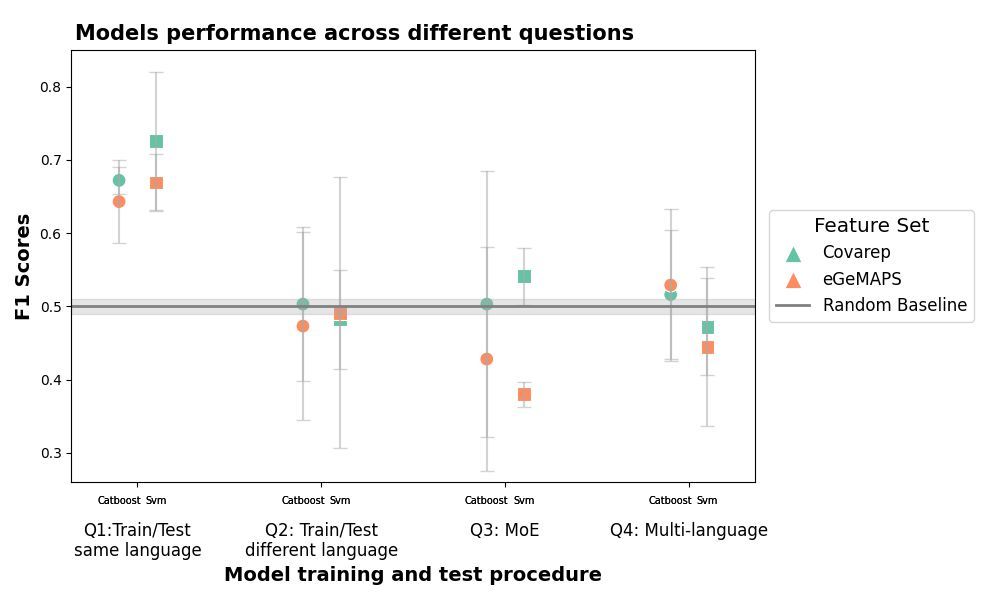
7/8 🌍 Why does generalization fail?
• Linguistic differences affect how SCZ symptoms relate to acoustic features
• Clinical heterogeneity limits robustness of ML models trained on small, homogenous samples
• Models biased toward general features, not capturing diagnosis- or symptom-specific markers
03.12.2024 16:16 — 👍 0 🔁 0 💬 1 📌 0
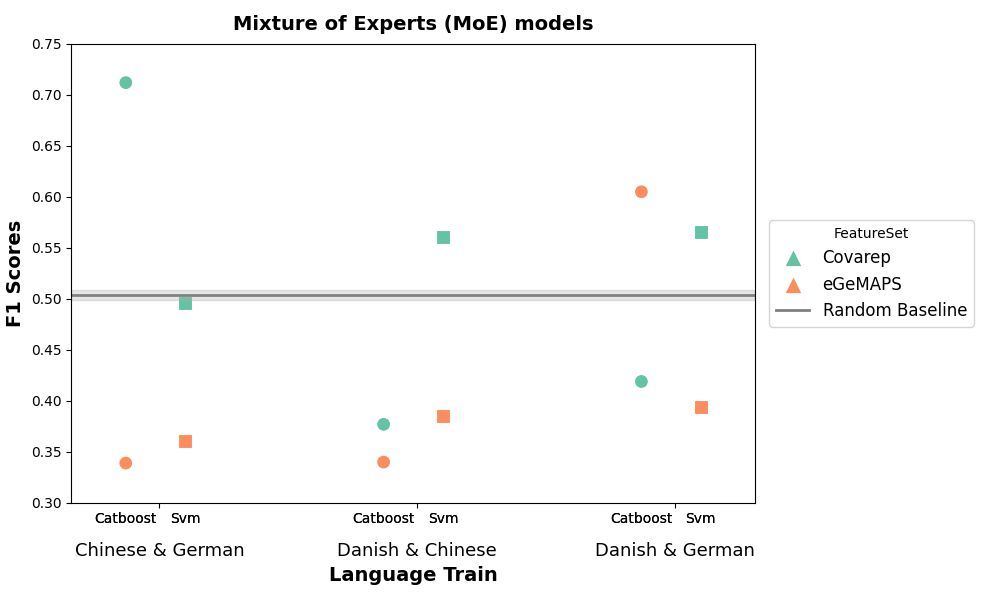
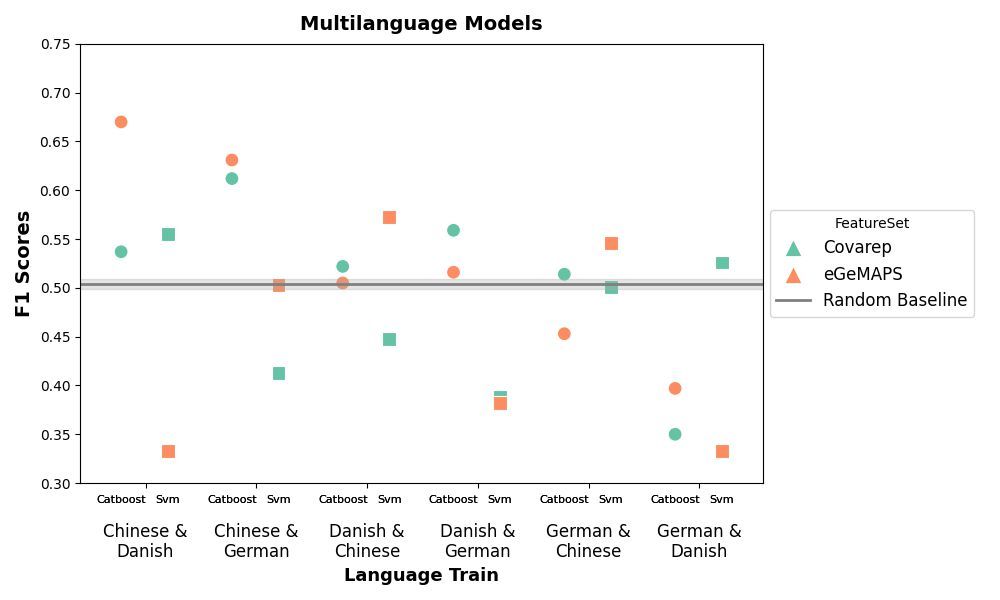
6/8 📢 Key Finding #3:
We tested two alternative approach:
1️) Mixture of Experts models (combining predictions from models trained on different languages, Plot 3).
2) Multi-language training set (combin. training data from multiple languages, Plot 4).
❌ Results: Still near chance level (F1 ~ 0.50).
03.12.2024 16:10 — 👍 0 🔁 0 💬 1 📌 0
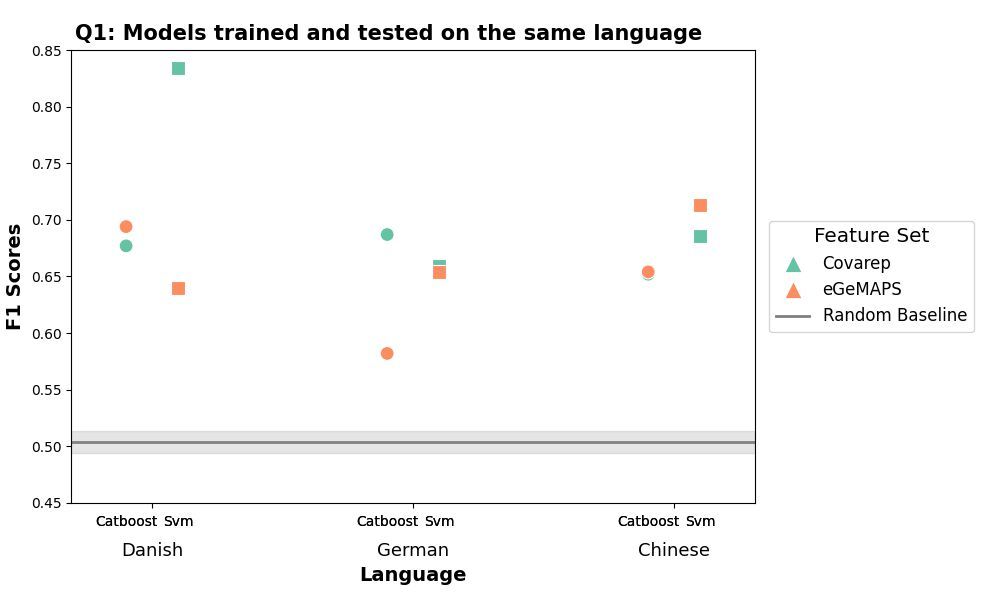
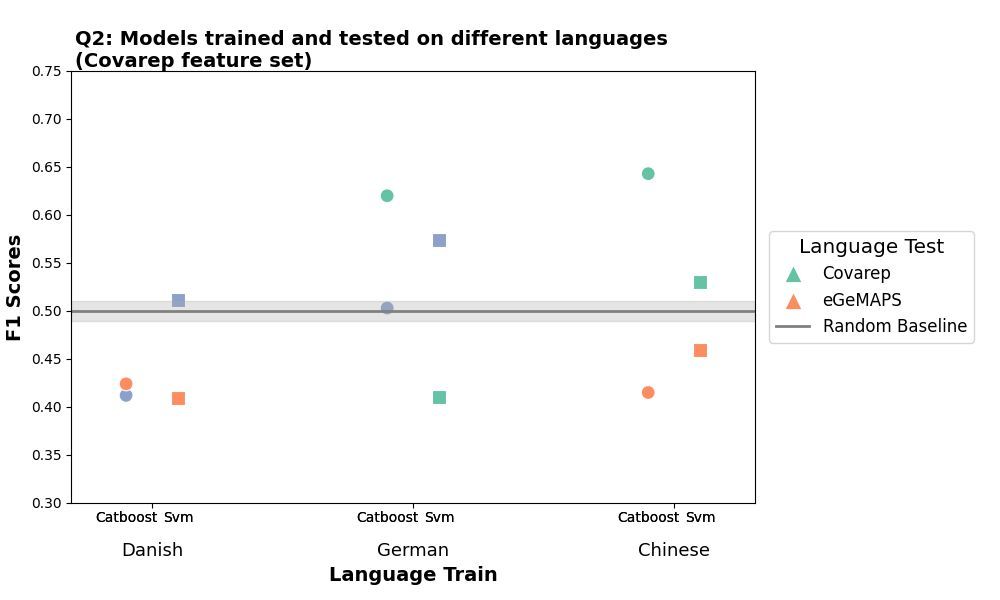
5/8 🚨 Key Finding
✔️#1: ML models perform when trained/tested on the same language (F1 ~ 0.75) (Plot1)
❌#2: But when trained/tested on different languages (e.g., Danish → Chinese), performance drops significantly (F1 ~ 0.50) (Plot 2).
Cross-linguistic generalizability remains a key challenge!
03.12.2024 16:06 — 👍 0 🔁 0 💬 1 📌 0
4/8💡What’s the goal?
In this study we build a large cross-linguistic speech corpus (Danish, German, Chinese) of patients with schizophrenia and controls to systematically test whether voice-based ML models predicting schizophrenia generalize across different languages, samples and context: 🧵
03.12.2024 15:59 — 👍 0 🔁 0 💬 1 📌 0
2/8💡Key question ❓
But how well do voice-based machine-learning models generalize across languages and cultural contexts? How well do they generalize across samples with heterogenous clinical features? Are they robust enough to biases for clinical applicability?
03.12.2024 15:45 — 👍 0 🔁 0 💬 1 📌 0
1/8 Schizophrenia and machine-learning-based speech markers
🎙️ Schizophrenia is associated with atypical voice patterns, making voice a promising candidate biomarker. Voice-based ML models can indeed predict diagnosis, symptoms and track socio-cognitive and motor features of SCZ with high accuracy.
03.12.2024 15:44 — 👍 0 🔁 0 💬 1 📌 0
For more work in this line of research:
- do markers of schizophrenia and its symptoms generalize across languages? (voice: doi.org/10.1093/schb... text: doi.org/10.1016/j.sc...; led by
A. Parola) 1/
28.10.2024 14:10 — 👍 3 🔁 2 💬 1 📌 0
Italian Conference on Computational Social Science
May 19-21, 2026 | Torino, Italy
https://cs2italy.org/
Associate Professor in Cognitive Psychology at the University of Bergen, Norway. I study decision-making and biases in perception and visual working memory, with occasional forays into higher level decisions. https://andreychetverikov.org
Language, interaction, tech • Here with doubts about the next monetizable monopoly... • papers https://markdingemanse.net • blog https://ideophone.org • fedi https://scholar.social/@dingemansemark/ • POSSE: Publish on Own Site, Syndicate Everywhere
PhD student @ SINeLab (Technical University of Denmark). Exploring interpersonal temporal dynamics of social interaction - in the lab and out in the wild.
A career network featuring science jobs in academia and industry.
Visit our platform at www.science.hr
Grad Student in Comp Sci @ UIUC @uofigrainger.bsky.social | Former Sr. Research Asst. in Radiation Physics @ Univ. of Texas MD Anderson Cancer Center @mdanderson.bsky.social, developed AI for RPA https://rpa.mdanderson.org | 🏳️🌈 he/him | Views are my own
Post-doc researcher @ Italian Institute of Technology,Rome. Studying how we understand others.
taciturn lapsed neuroscientist
Guest Researcher with the focus on #Autism Spectrum Disorders and #Biolinguistics at Universität Potsdam
https://www.researchgate.net/profile/Candice_Chi_Hang_Cheung
Phonetician. Speech Tech Enthusiast. I work on multi-party phonetic accommodation, with a focus on cooperative tasks, communication, and EdTech applications.
Fan of the phonetic inventories of Indic languages.
More than the sum of parts. 🗣️🎙️🧶📚
Assoc. Professor at UC Berkeley
Artificial and biological intelligence and language
Linguistics Lead at Project CETI 🐳
PI Berkeley Biological and Artificial Language Lab 🗣️
College Principal of Bowles Hall 🏰
https://www.gasperbegus.com
Associate Professor of Psychiatry at Vita-Salute San Raffaele University of Milan. Focus on psychosis, language and rehabilitation.
Professor of Economics, Sapienza University of Rome | IZA Fellow, Bonn | fabiosabatini.site.uniroma1.it | Substack: https://fabiosabatini.substack.com/
Associate professor at Uni Trento. Infectious disease modeling | computational social science.
cultural evolution, behavioral ecology, math models, data provenance, MOSAIC group leader @ Max Planck Institute for Evolutionary Anthropology + faculty at the Leipzig School of Human Origins https://babeheim.com/
Prof. of Computational Cognitive Science at TU Darmstadt & PI of the Human and Machine Cognition lab | hmc-lab.com
University lecturer @oulu.fi | PI of the @percola.bsky.social | eye movements | visual cognition | reading | figurative language
>> https://olkoniemi.com
Conducts research in language development, language and cognition and neurodevelopmental disorders
DiLi lab at the Department of Computational Linguistics, University of Zurich. 👀🤖📖🧠💬 https://www.cl.uzh.ch/en/research-groups/digital-linguistics.html







